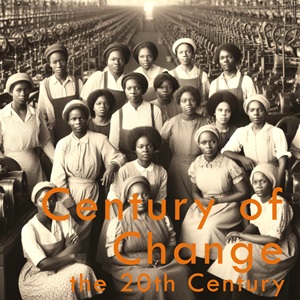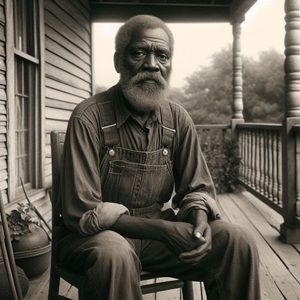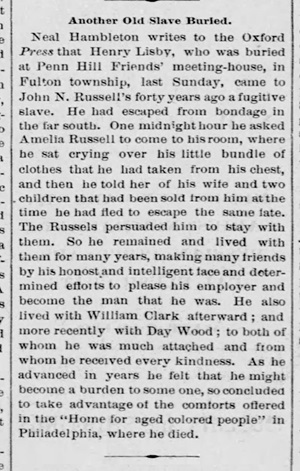
to
freedom

Harrisburg's African American Community Moves Through the Twentieth Century
Study Areas
Henry Lisby, a Formerly Enslaved
African American, Is Buried in Lancaster County

Significant numbers of formerly enslaved African Americans made their homes in central Pennsylvania in the 19th and 20th centuries. Some escaped enslavement and traveled north via the Underground Railroad before 1865. Many more found themselves no longer enslaved by war's end and looked north for job opportunites or to escape the harsh poverty and crushing racism of southern Reconstruction. The first few decades of the 20th century saw large numbers of southern Blacks moving north to take advantage of the plentiful jobs in northern industries.
Their presence in northern cities enriched each African American community. Their shared first-hand stories of lives enslaved broadened the historical perspective and served to counter the "Lost Cause" myths. Knowing which citizens were formerly enslaved is invaluable for modern historians and persons researching their family histories. Small connections can often add up to bigger stories. The news items below represent snippets in the lives of these persons.
News Item, November 21, 1885

Text of news article:
Another Old Slave Buried.
Neal Hambleton writes to the Oxford Press that Henry Lisby, who was buried at Penn Hill Friends' meeting-house, in Fulton township, last Sunday, came to John N. Russell's forty years ago a fugitive slave. He had escaped from bondage in the far south. One midnight hour he asked Amelia Russell to come to his room, where he sat crying over his little bundle of clothes that he had taken from his chest, and then he told her of his wife and two children that had been sold from him at the time he had fled to escape the same fate. The Russells persuaded him to stay with them. So he remained and lived with them for many years, making many friends by his honest and intelligent face and determined efforts to please his employer and become the man that he was. He also lived with William Clark afterward; and more recently with Day Wood; to both of whom he was much attached and from whom he received every kindness. As he advanced in years he felt that he might become a burden to some one, so concluded to take advantage of the comforts offered in the "Home for aged colored people" in Philadelphia, where he died.
Notes
John N. and Amelia Russell were Lancaster County Quaker abolitionists who aided fugitive slaves, as depicted in the story above. They received freedom seekers from fellow Quaker Joseph Smith, whose farm Locust Grove was located in Drumore Township. The Russell's regularly hosted prominent abolitionist leaders in their home, including William Lloyd Garrison, Lucretia Mott, Daniel Gibbons and Charles C. Burleigh. The Russells forwarded freedom seekers to Henry Bushong's farm in Bart Township.
Day Wood, also mentioned above, was a Quaker abolitionist farmer in Fulton Township who is also believed to have been an Underground Railroad stationmaster.
Henry Lisby's grave is in the Penn Hill Friends Burial Ground, Penn Hill Lancaster County. His tombstone reads: "Henry Lisby./ An ex-Slave./ Died 11th mo. 10th 1885./ aged 86 years." The biographical data lists his birth in 1799 in Maryland. It is on Find-a-Grave at: https://www.findagrave.com/memorial/135074738/henry-lisby.
Sources
The Inquirer (Philadelphia, PA), 21 November 1885.
"The Pilgrim's Pathway: The Underground Railroad in Lancaster County," by Charles D. Spotts, Community History, Vol. 5 No. 6 (December 1966).